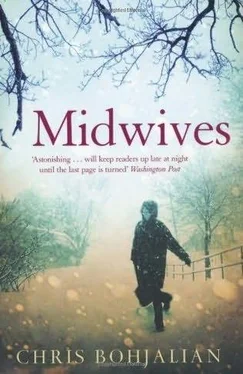Chris Bohjalian - Midwives
Здесь есть возможность читать онлайн «Chris Bohjalian - Midwives» весь текст электронной книги совершенно бесплатно (целиком полную версию без сокращений). В некоторых случаях можно слушать аудио, скачать через торрент в формате fb2 и присутствует краткое содержание. Жанр: Современная проза, на английском языке. Описание произведения, (предисловие) а так же отзывы посетителей доступны на портале библиотеки ЛибКат.
- Название:Midwives
- Автор:
- Жанр:
- Год:неизвестен
- ISBN:нет данных
- Рейтинг книги:5 / 5. Голосов: 1
-
Избранное:Добавить в избранное
- Отзывы:
-
Ваша оценка:
- 100
- 1
- 2
- 3
- 4
- 5
Midwives: краткое содержание, описание и аннотация
Предлагаем к чтению аннотацию, описание, краткое содержание или предисловие (зависит от того, что написал сам автор книги «Midwives»). Если вы не нашли необходимую информацию о книге — напишите в комментариях, мы постараемся отыскать её.
Midwives — читать онлайн бесплатно полную книгу (весь текст) целиком
Ниже представлен текст книги, разбитый по страницам. Система сохранения места последней прочитанной страницы, позволяет с удобством читать онлайн бесплатно книгу «Midwives», без необходимости каждый раз заново искать на чём Вы остановились. Поставьте закладку, и сможете в любой момент перейти на страницу, на которой закончили чтение.
Интервал:
Закладка:
BEDFORD: Yes, but-
HASTINGS: And despite the fact that you had been awake all night long. No, not just all night. A full twenty-four hours. Is that the testimony you actually want the jury to believe?
BEDFORD: I know what I saw.
DORSET: Does counsel have any further questions for the witness?
HASTINGS: Yes.
DORSET: Then please proceed.
HASTINGS: Did you believe your wife was dead when you went to the window?
BEDFORD: Oh, yes.
HASTINGS: Did you love her?
BEDFORD: Of course.
HASTINGS: Were you sad?
BEDFORD: Good Lord, yes!
HASTINGS: Were you very sad?
BEDFORD: Yes
HASTINGS: And was it in that frame of mind that you think you saw blood spurt?
BEDFORD: Yes, but I was not hysterical. I'm telling you, I know what I saw.
HASTINGS: And yet, did you make any effort-any effort at all-to stop Sibyl when you saw the blood?
BEDFORD: No, as I told Mr. Tanner, I thought it was normal. I assumed my Charlotte had passed away, and this was just… just what the body did…
Stephen had told my parents while they were discussing strategy the night before that there would be two issues with Asa's testimony: what the man could have seen, and what the man would have seen. Stephen was firmly convinced that no husband in his right mind would actually have brought himself to witness a knife going into his dead wife's belly, and that was the real reason Asa had gone to the window. But first, he told my parents, he would cast doubt upon what Asa could have seen from the bedroom that morning.
Stephen's cross-examination of the reverend began right after lunch and continued until we recessed for the day. There were moments that afternoon-brief but thrilling-when I was convinced with the confidence of a teenager that Stephen had persuaded every soul in the courtroom that it wasn't logical to believe Asa Bedford would actually have watched his wife's cesarean, and it was unlikely he could have seen blood spurt even if illogic had somehow prevailed. No man in Asa's position, I told myself, could be completely sure of what he had seen, and-perhaps more important-no man would have been willing to watch.
But when the cross-examination was over, the fact remained that Asa Bedford was still a clergyman: In our corner of the Kingdom in 1981, this meant his words had weight. Great weight, despite the eccentricities of his church's dogma. I thought Stephen's cross-examination had been wonderful, but when we all went to our separate homes for dinner, I nevertheless feared one cross-examination-even a good one-could not undo a week of damaging medical testimony and the memories of the minister.
When girls are little, their dolls are likely to be babies, not Barbies.
So said Stephen Hastings. Stephen, of course, had no children.
But this didn't stop him from having strong opinions about how children thought and what they believed. After all, he said one night when my father challenged him, he had been one himself. Stephen would readily admit that he hadn't the foggiest notion of how one should raise a child-how to discipline one, or reward one, or simply smother one with love-but he insisted he understood well the logic that informed a child's mind. A girl's mind as well as a boy's.
And Stephen was convinced that little girls loved baby dolls-plastic infants that demanded no maintenance. No rocking, no feeding, no changing, no watching. No work. Only mock howls, play colic, pretend pangs of hunger. Imaginary dirty diapers. Make-believe mess. Eventually, he said, baby dolls would drop off the child's radar screen. Older dolls might or might not, depending upon whether the little girl discovered Barbie and Skipper and Ken. But plastic babies-and the instinctive desire to nurture something small and needy-did. Some girls got the nurture bug back when they began puberty, and used baby-sitting as a substitute. Others didn't rediscover the desire to mother until they were adults themselves, and the primordial need to dispose of the diaphragm and continue the species overwhelmed all reason.
And then, of course, there were those girls who became mid-wives: girls who could not get enough of the tiniest of babies-the newborn-girls who would grow into women who absolutely reveled in the magnificent but messy process of birth.
As spring became summer and Stephen steeped himself in the culture of home birth, he concluded that the principal difference between the woman who becomes an ob-gyn and the woman who becomes a midwife had less to do with education or philosophy or upbringing than it did with the depth of her appreciation for the miracle of labor and for life in its moment of emergence. Women who became doctors viewed themselves as physicians first, ob-gyns second. He felt that when these girls began focusing seriously on what they wanted to be when they grew up-in high school or college-they probably decided originally that they simply wanted to be doctors. Then, perhaps in medical school, they narrowed in on obstetrics.
Those girls who became midwives, on the other hand, knew midwifery was their calling at a very early age, or-as my mother's path suggested-had one profound, life-changing experience involving birth that pulled them in. Stephen was adamant that the women who became ob-gyns loved babies no less than midwives, but they were the type who were more likely at a young age to trade dolls that one dressed for toy cribs for dolls that one dressed for pretend formals.
Certainly Stephen was on to something in my case, at least when it came to dolls. My dolls stayed babies barely beyond my arrival in first grade; almost overnight that year they became a small world of Barbies obsessed with clothing and cars and the color of their hair. I even had a Nurse Barbie, although to be honest she spent most of her time with Ken with her clothes off.
Yet did I become an obstetrician simply because I wanted to be a doctor, and I happened to grow up in a house that made me comfortable with the anatomic terrain? I doubt it. And after watching the way some ob-gyns clinically picked my mother apart in the courthouse-using the third person as if she weren't sitting merely a half-dozen or so yards away-it's arguable I might have developed such a visceral distaste for the entire profession that I would have become anything but a baby doctor.
To this day, some of my mother's friends think I've betrayed her by becoming an ob-gyn. There are two midwives in Vermont who won't speak to me, or to the midwives who use me as their backup physician. But as I've said to all those midwives from my mother's generation with whom I've remained friends, or to those midwives of my generation with whom I've become friends, my choice of profession was neither an indictment of my mother's profession nor a slap at her persecutors. Clearly her cross was a factor in my decision-all my C-sections have been upon inarguably living women, each one properly anesthetized and prepared for the procedure-but as a friend of mine who's a psychiatrist says, motives don't matter: Most of the time we don't even know what our motives are. And while I learned from my mother that how babies come into this world indeed matters, I learned from her detractors the ineluctable fact that most babies come into this world in hospitals. In my opinion, I do a lot of good in delivery rooms and ORs, and while I don't use an herb like blue cohosh, I've never once had a prenatal exam that took less than half an hour. I get to know my mothers well.
Stephen brought in the specialists fast, even before my mother was charged with a crime. In addition to a photographer to chronicle the cuts and bruises my mother received crawling around the ice by her car, he immediately hired an accident reconstructionist to examine the slope and width of the Bedfords' driveway. He wanted to be sure there could be no doubt in a jury's mind that my mother had done everything humanly possible to try and transfer Mrs. Bedford to the hospital the night that she died, but the driveway had been a mess and the roads impassable: My mother did what she did because she hadn't a choice.
Читать дальшеИнтервал:
Закладка:
Похожие книги на «Midwives»
Представляем Вашему вниманию похожие книги на «Midwives» списком для выбора. Мы отобрали схожую по названию и смыслу литературу в надежде предоставить читателям больше вариантов отыскать новые, интересные, ещё непрочитанные произведения.
Обсуждение, отзывы о книге «Midwives» и просто собственные мнения читателей. Оставьте ваши комментарии, напишите, что Вы думаете о произведении, его смысле или главных героях. Укажите что конкретно понравилось, а что нет, и почему Вы так считаете.











